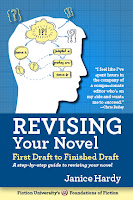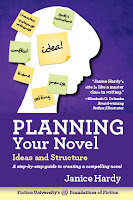"How can I tell if my manuscript is finished?" is a pretty common question for new writers. There's that rush as you write the last word, but more work is to come. Revision after revision after revision goes by, and then the itchiness to get moving starts.
You're sick of the book and want to send it out.
You can't wait any more to hear what agents have to say.
You just heard about someone getting a big deal in your genre and you feel now is the time to strike.
But sending out a manuscript before the book is ready can blow your chances at success (whether you're going traditional or self publishing). It's easy to get caught up in the excitement, but take a step back and make sure there's nothing else you can do to make the book better. You only get one shot with this book, so don't waste it.
(Here's more on what to do once you've written a novel)
You're probably ready to submit if:
All you're doing is tweaking a word here and there and not changing anything about the story, such as the plot or characters: If nothing about the story changes and every read through results in minor word choices (such as, you decide a comma should move, or you cut one or two words out a hundred pages), then the story is probably how you want it, and it's the best you can make it.
You get a rush reading it, even though it's for the 107th time: If you still love the work and think it's good after reading it over and over and over, then it's probably good to go. There must be something special there if you still enjoy reading it.
You are so sick of it you never want to look at it again: On the flip side, it's common to be so sick of a manuscript by the end you just want it out of your life. If there are no nagging thoughts that it still needs work, and you want it gone, let it go. In these cases, sometimes it's helpful to let the manuscript sit for a few months or months to gain some distance and objectivity. Let it sit, forget all the specifics of the story, then re-read it later and see how you feel. Often, you spot issues (or a lack of issues) after you've gained some perspective on the work.
You just feel it's ready: Every writer will be different here, but sometimes, you just know a manuscript is ready to go out and face the world. If your instincts are saying go for it, trust yourself.
One caveat: No matter how sure you are about the work, if the writing isn't yet at a professional level, you could still wind up with rejections. Knowing a manuscript is ready is only the first step of the process. If you're not sure how your writing compares to the pros yet, seek trustworthy beta readers or critique partners to review the work. If you're comfortable about your skill level, then proceed.
(Here's more on when to know if you should give up on a novel)
You're probably not ready to submit if:
You're thinking about adding a prologue because the story doesn't really take off until chapter three, and you want to hook readers so they're willing to slog through chapters one and two to get to the good stuff: The first page of a manuscript should hook your readers, so if you're trying to find ways to get them to stay with your story until it gets good, then it's not good enough yet. Keep revising until the manuscript shines from page one.
You're unsure about something that affects the story, such as a character, a scene, or a plot twist: If your instincts are nagging at you that something isn't right, trust them. Find some beta readers to offer you another opinion, or let the manuscript for a while to gain objectivity. If it fits your budget, you could even take a workshop or hire an editor to see what's wrong.
Spelling and grammar aren't your strong suit, but that's what editors are for, right? Wrong. No one will reject you for one or two typos or errors, but your manuscript needs to be clean and professionally written. If you're making mistakes on most pages, or your writing at a beginner level, you need to develop your skills more before you start submitting.
(Here's more on what to look for before you submit your manuscript)
It's 245,000 words. And book one of a trilogy. That ends with a cliffhanger that doesn't resolve the conflict of book one: Although the occasional outlier does slip through, 99% of novels fall into general word count ranges, and the first book resolves the core conflict. If your manuscript lies way about and outside what's normal for your genre and market, odds are it won't get past the query stage.
You don't know what I mean by conflict: If you don't understand the basics of storyrtelling, you're probably not ready to submit that story yet. While natural storytellers do exist. most of us need to study and practice before we're ready.
Is your novel ready? Have you ever sent out a novel too soon?
 Looking for tips on revising your novel? Check out my book Revising Your Novel: First Draft to Finished Draft, a series of self-guided workshops that help you revise your manuscript into a finished novel. Still working on your idea? Then try my just-released Planning Your Novel Workbook.
Looking for tips on revising your novel? Check out my book Revising Your Novel: First Draft to Finished Draft, a series of self-guided workshops that help you revise your manuscript into a finished novel. Still working on your idea? Then try my just-released Planning Your Novel Workbook.  A long-time fantasy reader, Janice Hardy always wondered about the darker side of healing. For her fantasy trilogy The Healing Wars, she tapped into her own dark side to create a world where healing was dangerous, and those with the best intentions often made the worst choices. Her novels include The Shifter, Blue Fire, and Darkfall from Balzer+Bray/Harper Collins. The Shifter, was chosen for the 2014 list of "Ten Books All Young Georgians Should Read" from the Georgia Center for the Book. It was also shortlisted for the Waterstones Children's Book Prize, and The Truman Award in 2011.
A long-time fantasy reader, Janice Hardy always wondered about the darker side of healing. For her fantasy trilogy The Healing Wars, she tapped into her own dark side to create a world where healing was dangerous, and those with the best intentions often made the worst choices. Her novels include The Shifter, Blue Fire, and Darkfall from Balzer+Bray/Harper Collins. The Shifter, was chosen for the 2014 list of "Ten Books All Young Georgians Should Read" from the Georgia Center for the Book. It was also shortlisted for the Waterstones Children's Book Prize, and The Truman Award in 2011.  Janice is also the founder of Fiction University, a site dedicated to helping writers improve their craft. Her popular Foundations of Fiction series includes Planning Your Novel: Ideas and Structure, a self-guided workshop for planning or revising a novel, the companion Planning Your Novel Workbook, Revising Your Novel: First Draft to Finished Draft, and the upcoming Understanding Show Don't Tell (And Really Getting It).
Janice is also the founder of Fiction University, a site dedicated to helping writers improve their craft. Her popular Foundations of Fiction series includes Planning Your Novel: Ideas and Structure, a self-guided workshop for planning or revising a novel, the companion Planning Your Novel Workbook, Revising Your Novel: First Draft to Finished Draft, and the upcoming Understanding Show Don't Tell (And Really Getting It). Website | Facebook | Twitter | Goodreads | Amazon | Barnes & Noble | iTunes | Indie Bound


I'm definitely reaching the "I'm so sick of it, I never want to look at it again" stage. I've got 30 pages of revisions left and then...we'll see.
ReplyDeleteI reached the "I'm so sick of it, I never want to look at it again" stage, BUT I was also "unsure about something that affects the story, like a character, a scene, or a plot twist." (It's the one where I realized the book focuses on the wrong antagonist.)
ReplyDeleteMusing on that made me realize that my "I'm so sick of this" reaction is to particular (parts of) scenes. I sometimes want to wring the narrator's neck for her to shut up. That's bad.
So, I've started off with two parallel documents, the original and a blank page, and am rewriting things. For the first time in the seven years I've worked on the story, I can't tell you the first few lines.
I'm only a few scenes in, but my interest has already increased. And wow, some of the details even INFLUENCE the situation, now. Amazing. [/sarcasm]
I'm only letting myself copy and paste a line when I still actively enjoy and like it despite the many years I've spent working on this book. Anything less is getting kicked out the door--even if I don't see anything wrong with it.
So, thanks, Ms. Hardy, for helping me realize what I probably need to do so I can love my book, again. :-)
I'm still at the "rush" stage even after working on it for almost five years. I never get tired of reading it and tweaking it!
ReplyDeleteMost welcome!
ReplyDeleteCarradee, you took the words right out of my mouth. I'm also ready to strangle my MC and I think that means I need to do some work on her still, even after 7 years (same here). So I've done the same as you, starting tonight after feedback from a beta who just read the whole thing (that I thought was ready, silly me). I've opened a new doc in Scrivener below each chapter, and I'm going through rewriting and editing as I go. It's a technique I've used in the past and it helps me become AWARE of some of the lines that have survived uselessly through past revisions.
ReplyDeleteGreat post, as always, Janice!
Driving, riding my bike, practicing on the piano, when I think of something I should add or change in the manuscript, I scribble a one-word note. Later, I attack the manuscript with the change. When will that stop, it’s never ending? Good for the rest of my life, not so good for the rest of the book!
ReplyDeleteJanice, another great post!
Hehe, so true. There are things in The Shifter I still want to change, and it's been out seven years now. :) I think that's just the nature of writing.
DeleteGreat post, Janice and good reminder to take our time. @sheilamgood at Cow Pasture Chronicles
ReplyDeleteThanks!
Delete